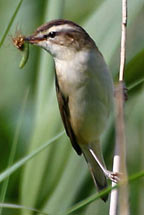
Navigation is defined as the process or activity of
accurately ascertaining one's position and planning and following a route.
Eurasian reed warblers captured and dropped 1000 km east of their north-south
migration path mysteriously shifted their orientation to get back on the path
home. The birds seemed to be able to identify two coordinates corresponding
roughly to geographic latitudes and longitudes and were not limited to
north-south direction as previously thought.
This finding is surprising and presents a new intellectual challenge to
scientists, namely the cues that enable birds to determine their east-west
position, according to Mikita Chernetsov at the Zoological Institute in Russia.
Other studies have suggested that birds use the sun or geomagnetic information
to determine their latitude, north-south location. The Russian team suggested
that the warblers might rely on a second internal clock to determine their
geographic longitude “even if we do not currently know how they do it”.
Scientific consciousness provides an awesome range of knowledge for a better
understanding of the universe and the environment, and for the development of
tools to improve the material standard of life...and the tools for destruction!
Scientific training seeks objectivity, recognizing what can be measured or
observed, excluding non-physical aspects such as the generosity, justice and
intelligence of nature.
While the investigators observed the behaviour of the birds, they can only
speculate how Nature works at more subtle levels. Studies such as this one call
for a broader way of knowing: a science of wholeness and implicate order; a
science of the living Earth; a science that accepts the principles of
uncertainty, interconnectedness, surprise and the mystery of Life.